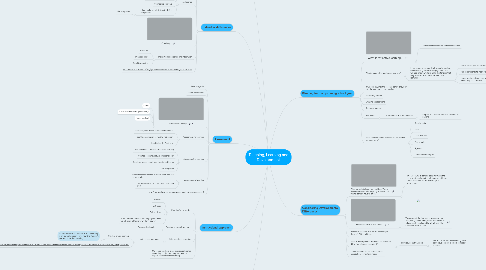
1. Establishing a positive learning environment
1.1. "Every child needs a champion"
1.1.1. I love the message in this video and it allowed me to reflect on my own experiences as a student and what kind of teacher I want to become.
1.2. DCM: Dynamic classroom management
1.2.1. Including student ideas
1.2.2. Interaction between teacher and students
1.2.3. Proactive approach
1.3. Creating a community
1.3.1. TRIBES
1.3.2. Creating an accepting and welcoming space
1.3.3. Equity and fairness
1.4. Classroom management
2. Instructional approach
2.1. Meaningful instruction
2.1.1. Bell work
2.1.2. Exit ticket
2.1.3. Golden ticket
2.1.4. "If we teach students as we taught yesterday's, we rob them of tomorrow"- John Dewey
2.2. Creating an overall approach
2.2.1. Cooperative learning
2.3. Differentiated instruction
2.3.1. Inquiry based approach
2.3.1.1. Student driven learning
2.3.1.1.1. An approach I am interested in implementing in my own classroom. I love how the student's interests drive their learning.
2.3.1.2. https://owl.uwo.ca/access/lessonbuilder/item/64599435/group/76853f24-6714-4958-86af-06f669536194/Week%204:%20Making%20Instructional%20Decisions/CBS_InquiryBased.pdf
2.4. "Our job as teachers is not to prepare kids for something; our job is to help kids learn to prepare themselves for anything"
3. Assessment
3.1. Learning goals
3.2. Bloom's taxonomy
3.3. Standardized testing
3.3.1. EQAO
3.3.2. Is standardized testing necessary?
3.3.3. Fair or not fair?
3.4. Assessment for learning
3.4.1. Gain insight into what students understand
3.4.2. Use this information to modify instruction
3.4.3. Provide helpful feedback
3.5. Assessment as learning
3.5.1. Self assessment: monitor process of learning
3.5.2. Creates accountability and responsibility
3.5.3. Develops awareness of how the student learns
3.5.4. Metacognition
3.6. Assessment of learning
3.6.1. Inform teacher what the students know and can demonstrate
3.6.2. Use this information collected to build and grow
3.7. http://www.edu.gov.on.ca/eng/policyfunding/growsuccess.pdf
4. Individual differences
4.1. Students with exceptionalites
4.2. Intelligence
4.2.1. Carrolls' Hierachal
4.2.2. Gardners Multiple Intelligence
4.2.3. Steinbergs' Triarchic
4.2.4. Is there really one definition to define intelligence?
4.2.4.1. Metacognition
4.3. Creativity
4.4. Instruction intelligence and integration
4.4.1. Place mat
4.4.2. Think pair share
4.4.3. Graphic organizer
4.5. http://www.edu.gov.on.ca/eng/general/elemsec/speced/learningforall2013.pdf
5. Socio-Cultural Considerations
5.1. Individualism vs collectivism
5.2. Cultural frameworks: what is present in my classroom? How will I make each cultural framework valued and represented?
5.3. SES
5.3.1. What does SES have to do with student achievement?
5.4. A multi cultural approach
5.4.1. How will I include the diverse cultures present in my class?
5.4.1.1. Multicultural food fair
5.4.1.2. Parent presentations
5.4.1.3. Heritage day
5.4.1.4. Embassy day
5.4.1.5. Celebrate all holidays in our classroom
6. Planning for the upcoming school year
6.1. What is reflective learning?
6.1.1. Student centred learning vs teacher centred
6.2. Who is responsible for student learning?
6.2.1. In my future classroom, I will promote student driven learning to ensure engagement. This will also ensure we have an understanding that they are also responsible for their own learning!
6.2.1.1. Get to know my students interests.
6.2.1.1.1. Who? What? Where?
6.2.1.2. Plan to differentiate instruction.
6.2.1.2.1. How?
6.2.1.3. Learn my students areas of strengths and areas where they can improve.
6.3. "Students buy into the teacher before they buy into the learning"- Urban teacher
6.4. Establising routine
6.5. Creating engagement
6.6. Behaviour support
6.7. Be a leader
6.7.1. Collaborate with other teachers
6.7.1.1. Prepare to communicate with students and parents
6.8. What types of communication will be used in my classroom?
6.8.1. Social media
6.8.2. Email
6.8.3. Class website
6.8.4. Phone calls
6.8.5. Agendas
6.8.6. Communication Apps
7. Considering Developmental Differences
7.1. What can adults learn from children? Adora Svitak opens our minds up to just how much young learners have to offer.
7.1.1. This video was a learning point for me in the early weeks realizing that all students will come to the classroom with a wide range of knowledge.
7.2. Growth Mindset: Carol Dweck
7.2.1. The power of the "not yet" is a concept that has greatly impacted my views and beliefs on education. It has shaped how I will be in the classroom as an educator.
7.3. "Effective teaching may be the hardest job there is."- William Glasser
7.4. What is development? How does development differ from student to student?
7.4.1. Physical, cognitive, social
7.4.1.1. The importance of early learning: why early development is crucial to nurture success
